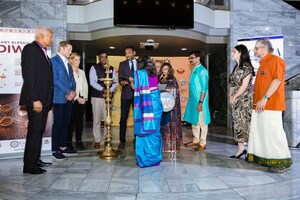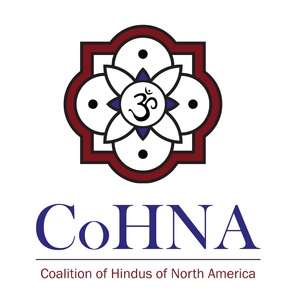Voices of Bangladeshi Hindus offer poignant and devastating window into the persecution underway
WASHINGTON, Dec. 18, 2024 /PRNewswire/ -- Amid the ongoing crisis facing Bangladeshi minorities, the Coalition of Hindus in North America (CoHNA) convened a timely and impactful discussion to address the increasingly systematic persecution of Hindus in Bangladesh. Featuring a panel of experts and firsthand accounts from Bangladeshi Hindus, the event shed light on the deep challenges facing the minority community and outlined actionable steps for justice and advocacy.
Since late July 2024, Bangladesh has seen a shocking surge in violence against its Hindu citizens. Reports of arson, looting, assaults, rapes, massacres, forced resignations, and temple desecrations have emerged, with perpetrators operating with impunity. While the government in Dhaka and media outlets have sought to frame this violence as 'politically motivated', CoHNA's webinar highlighted how these actions are in fact part of a decades-long pattern of religious persecution. The event drew attention to previous waves of anti-Hindu violence, such as the 2021 Durga Puja attacks, and emphasized the alarming demographic decline of Hindus in Bangladesh—from 22% in 1951 to under 8% today.
Moderated by CoHNA's leadership, the event featured a distinguished group of speakers:
- Dr. Richard Benkin: A renowned human rights advocate and author of A Quiet Case of Ethnic Cleansing: The Murder of Bangladesh's Hindus, Dr. Benkin presented stark data on the ongoing persecution of Hindus. "The world cannot ignore this ethnic cleansing," he stated. "Every day, a Hindu community is attacked, a temple is desecrated, or a family is forced to flee. If we don't act now, we are complicit."
- Subinoy Kumar Saha: A Dhaka-based professional and member of Sanatan Vidyarthi Samsad, Mr. Saha shared chilling accounts of life in Bangladesh, where Hindus face forced job resignations and restrictions on cultural practices. "When those who stand for justice are silenced, what hope remains?" he asked, referring to the arrest of Hindu leader Chinmoy Krishna Das under fabricated charges.
- Shyama Haldar: President of Michigan Kalibari Temple and a leader within the Bangladeshi diaspora, emphasized the critical role of advocacy by Hindus abroad. He himself had recently organized a protest in his hometown Detroit area. "If we don't raise our voices, the Hindu population in Bangladesh, already at 7.9%, could disappear within decades," he warned, urging action through rallies, media, and legislative engagement.
- Rana Banik: Representing CoHNA's Youth Action Network (CYAN), Mr. Banik called for mobilizing the younger generation. "This isn't just a Bangladeshi Hindu issue—it's a human rights issue. We must speak out and demand accountability," he said, sharing stories of how fear and persecution dominate the daily lives of his family and friends back home.
You can watch the full event here.
Persistent Persecution across Generations and Governments
While the persecution of Hindus in Bangladesh has received renewed attention since Prime Minister Sheikh Hasina was ousted from power, the minority community has been systematically targeted since the creation of the state. Hindus have faced discrimination, violence, and marginalization under successive political regimes.
Haldar, now in his 60s and a leader from Michigan's Bangladeshi diaspora, recounted his experiences as a young professional in Bangladesh. He described how he was repeatedly denied promotions and his career was "slow poisoned." Haldar also invoked the 2021 case of Jhumon Das, a young man whose social media post criticizing the provocative speech of an Islamist leader triggered anti-Hindu violence that ravaged his village. Instead of punishing the perpetrators, local police arrested Das, who spent six months in prison. He was arrested again in 2022 in a similar case, and is currently out on bail.
Building on Haldar's points, CoHNA's Banik also reiterated that Hindus were persecuted even under previous governments, and that he had hoped that things would be different after Mohammad Yunus, a Nobel laureate who had won accolades worldwide, came to power in August 2024. Unfortunately, his hopes were quickly dashed. "Yunus has aligned himself with far-right groups," Banik said. Within just two months of Yunus taking office, Durga Puja, the most significant Hindu festival, was abandoned in many communities out of fear of violence. "And yet Yunus claimed this was the most joyous celebration!" Banik remarked bitterly. He also shared the plight of his cousins, members of the International Society for Krishna Consciousness (ISKCON), who are visibly Vaishnav and now fear for their safety in Bangladesh.
A particularly troubling example of this persecution is the case of Chinmoy Krishna Das, a prominent Hindu monk and former ISKCON leader. Das, the spokesperson for the newly-formed Bangladesh Sommilito Sanatan Jagaran Jot, was arrested on November 25, 2024, under trumped-up charges of sedition, causing widespread tensions amongst his supporters and drawing international condemnation. A month earlier, he had addressed a massive Hindu rally that drew thousands of participants, in Chattogram. At the rally, the saffron Hindu flag was raised, and this was allegedly disrespectful to the Bangladeshi national flag and the pretext for his arrest. Haldar explained that the current administration views Das as a major threat because he has been able to unite the Hindu community, drawing thousands to his gatherings. "That unity is what scared them," he said, explaining why Das became a target.
Speaking from Dhaka, Saha, who is a prominent voice in the Hindu students' community, exposed the systemic obstruction of justice in Das' case. He detailed how Das has been denied proper legal representation and those advocating for him are being silenced. He highlighted the case of Kushal Baran Chakraborty, a Sanskrit professor at the University of Chattogram and a leading member of Das' new Hindu coalition, who was brutally attacked at a protest rally in Dhaka on November 25. He also spoke of how senior advocate Rabindra Ghose was manhandled in court on December 12 when sought to present Das' bail plea.
The state's repressive tactics and the uninhibited violence unleashed by mobs have had a chilling effect on Bangladesh's already vulnerable Hindu community. Saha referenced a now widely shared WhatsApp message sent to Chakraborty by a Hindu lawyer who witnessed the harassment of Das's legal counsel. The lawyer lamented that there was little hope for Das, warning that anyone who dared to represent him risked being "beaten to death in their chamber" while the case would remain stalled in the lower courts.
Global Advocacy and Diaspora Action
The webinar also highlighted the role of the diaspora in amplifying these human rights violations and holding perpetrators accountable. In the past few months diaspora Hindus have organized multiple demonstrations across North America—from New York, NY, the Bay Area, CA, Los Angeles, CA, Atlanta, GA, Cleveland, OH, in the United States, to Toronto, Montreal, Calgary, and the City of London in Canada — to name just a few. In Hamtramck, MI, Mr. Haldar organized a rally that garnered media attention, with participants showing unity by singing Bangladesh's national anthem and pausing for the Muslim call to prayer. These acts symbolized a commitment to peaceful coexistence while demanding justice.
Political engagement is growing, with leaders such as U.S. Congresspersons Raja Krishnamoorthi, Shri Thanedar, Ro Khanna, and Senator Chuck Schumer, as well incoming President Donald Trump and his nominees Vivek Ramaswamy and Tulsi Gabbard addressing the crisis. In Canada, several Members of Parliament including Kevin Vuong, Rob Oliphant, Chandra Arya, Kamal Khera, Melissa Lantsman, Shuv Majumdar and Leader of the Opposition Pierre Poilievre have called for action.
A Call to Action
"Hindus in North America have a moral duty to ensure these atrocities are not ignored," said CoHNA spokesperson Pushpita Prasad. "We must amplify these voices, demand action from our governments, and support organizations that help victims."
Dr. Benkin outlined steps for advocacy, including pressuring governments to review Bangladesh's trade benefits and financial support, particularly in sectors like garment exports and U.N. peacekeeping contributions.
CoHNA encouraged attendees to contact elected officials, participate in city council meetings, and share verified stories to raise awareness. An email campaign targeting U.S. and Canadian policymakers was launched during the event to build sustained pressure.
Read more testimony from the Hindus of Bangladesh here.
About CoHNA
CoHNA is a grassroots level advocacy and civil rights organization dedicated to improving the understanding of Hinduism in North America by working on matters related to the Hindu community and by educating the public about Hindu heritage and tradition. For more information, please visit https://cohna.org or follow us on Twitter, Facebook, LinkedIn and on Instagram.
SOURCE Coalition of Hindus of North America

WANT YOUR COMPANY'S NEWS FEATURED ON PRNEWSWIRE.COM?
Newsrooms &
Influencers
Digital Media
Outlets
Journalists
Opted In



Share this article